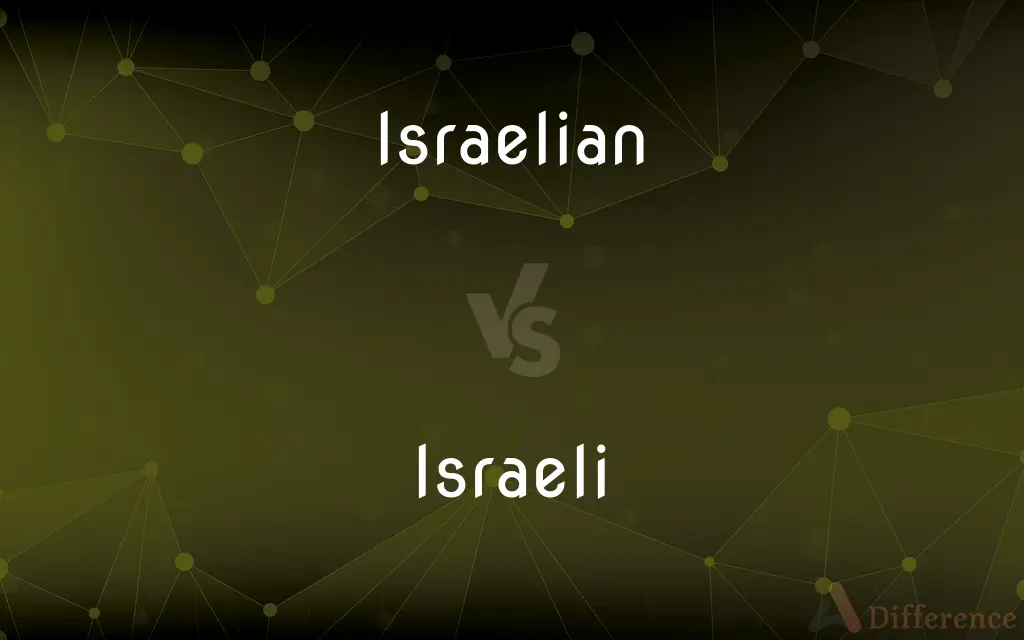Israelian vs. Israeli — What's the Difference?
Edited by Tayyaba Rehman — By Fiza Rafique — Updated on April 1, 2024
Israeli refers to anything related to the State of Israel or its citizens, while "Israelian" is not a standard term used in English for this purpose.

Difference Between Israelian and Israeli
Table of Contents
ADVERTISEMENT
Key Differences
The term Israeli is the correct adjective and demonym used to describe anything pertaining to the State of Israel or its citizens. It's widely recognized and used in international discourse, media, and formal communication. On the other hand, "Israelian" is not a commonly used term in English to refer to the people or attributes of Israel. While linguistic variations exist in the way demonyms are formed or used across different languages, in English, "Israeli" is the accepted norm.
The significance of using "Israeli" over any other variant like "Israelian" extends beyond mere linguistic preference; it reflects accuracy in identifying the nationality and culture of the people from Israel. This distinction is crucial in diplomatic, cultural, and social contexts, where precision in terms and names plays a key role in fostering understanding and respect among different nations and peoples.
The term "Israeli" is embedded in legal and official documents, including passports and national identification, signifying its importance and universality. Whether discussing politics, culture, or social issues, using "Israeli" ensures that the conversation is grounded in widely recognized and accepted terminology.
Comparison Chart
Definition
Not a standard term in English.
Pertaining to the State of Israel or its citizens.
Usage
Rarely, if ever, used; considered incorrect.
Widely used in international discourse, media, and formal communication.
ADVERTISEMENT
Applicability
Lacks a clear or recognized applicability.
Refers to all citizens of Israel, regardless of ethnic or religious background.
Linguistic Accuracy
Incorrect or non-standard form.
Correct demonym in English.
Importance
Use may lead to confusion or misunderstanding due to non-standardization.
Ensures clarity and correctness in identifying the nationality and culture of Israel's people.
Compare with Definitions
Israelian
Incorrect attempt to denote origin or citizenship in Israel.
Israelian foods, an incorrect reference to Israeli cuisine.
Israeli
A citizen of the State of Israel.
Israelis voted in their national elections yesterday.
Israelian
Misused in identifying products or technology from Israel.
Israelian tech innovations, where Israeli is the accurate adjective.
Israeli
Pertaining to the country or culture of Israel.
Israeli cuisine is known for its diverse flavors.
Israelian
Intended to refer to something from Israel but incorrectly formed.
The Israelian policy, though intended, is not the correct term.
Israeli
Relating to the official language or governmental aspects of Israel.
Hebrew is the Israeli national language.
Israelian
Mistaken usage in place of "Israeli."
An Israelian artist was mentioned in the article, but the correct term is Israeli.
Israeli
Associated with Israel's geographic or historical context.
The Israeli desert landscape is uniquely beautiful.
Israelian
Erroneous label for cultural or historical aspects of Israel.
The Israelian heritage site, instead of the correct Israeli heritage site.
Israeli
Referring to products or goods produced in Israel.
Israeli technology companies are recognized globally.
Israeli
Relating to the modern country of Israel.
Israeli
A native or inhabitant of Israel, or a person of Israeli descent.
Israeli
Of or relating to modern-day Israel or its people.
Israeli
A native or inhabitant of modern-day Israel.
Israeli
A native or inhabitant of Israel
Israeli
Of or relating to or characteristic of Israel or its people
Common Curiosities
How is the term Israeli used in legal documents?
In legal and official contexts, "Israeli" is used to denote nationality, appearing in passports and national identification documents.
Is "Israelian" a correct term to use?
No, "Israelian" is not a standard or correct term in English to refer to the people or attributes of Israel; "Israeli" is the correct usage.
What does Israeli mean?
Israeli refers to anything related to the State of Israel or its citizens, encompassing cultural, national, and legal aspects.
Can the term Israeli refer to non-Jewish citizens of Israel?
Yes, Israeli includes all citizens of Israel, regardless of their ethnic or religious backgrounds.
What is the significance of using the correct term like Israeli in media?
Using "Israeli" correctly in media ensures that information is conveyed accurately and respects the identity of the nation and its people.
Can language influence the formation of demonyms?
Yes, language plays a key role in demonym formation, but "Israeli" remains the standardized form in English for referring to the people or aspects of Israel.
Why is precision important when using demonyms like Israeli?
Precision in using demonyms is crucial for clear communication, cultural respect, and accuracy in international relations and discourse.
How does incorrect usage of demonyms like "Israelian" impact understanding?
Incorrect demonym usage can lead to confusion, misrepresentation, and potential disrespect towards the nation and individuals involved.
Are there any exceptions where "Israelian" might be considered correct?
In standard English usage, there are no contexts where "Israelian" would be considered correct over "Israeli."
What role do demonyms play in cultural identity?
Demonyms like "Israeli" play a significant role in cultural identity, signaling belonging, nationality, and cultural heritage.
Share Your Discovery

Previous Comparison
Furry vs. Yiff
Next Comparison
Summary vs. SynopsisAuthor Spotlight
Written by
Fiza RafiqueFiza Rafique is a skilled content writer at AskDifference.com, where she meticulously refines and enhances written pieces. Drawing from her vast editorial expertise, Fiza ensures clarity, accuracy, and precision in every article. Passionate about language, she continually seeks to elevate the quality of content for readers worldwide.
Edited by
Tayyaba RehmanTayyaba Rehman is a distinguished writer, currently serving as a primary contributor to askdifference.com. As a researcher in semantics and etymology, Tayyaba's passion for the complexity of languages and their distinctions has found a perfect home on the platform. Tayyaba delves into the intricacies of language, distinguishing between commonly confused words and phrases, thereby providing clarity for readers worldwide.












































